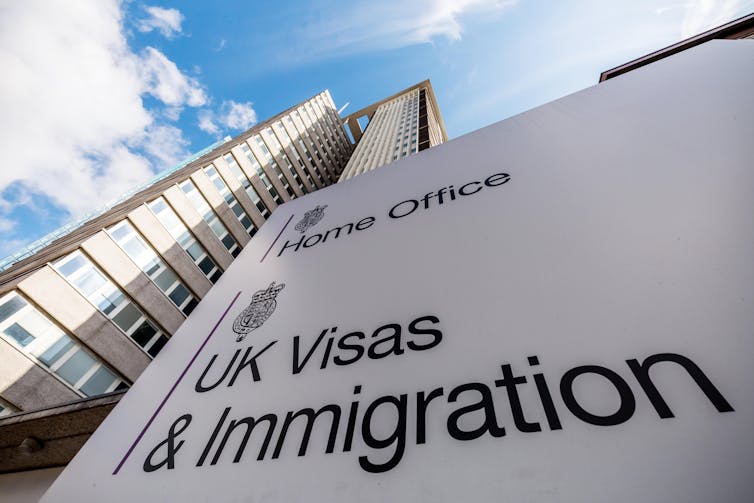After yet another tragedy in the Channel, there is no doubt that something needs to be done to improve the processes overseeing asylum seekers coming to the UK, through whatever route. The UK’s prime minister, Rishi Sunak, has outlined a five-point plan to fix Britain’s broken immigration system.
New laws will criminalise those who enter the country “illegally”, allowing people to be more rapidly deported. Newly arrived migrants will find it more difficult to open bank accounts, and definitions of modern slavery will be changed to make it harder to claim asylum on this basis. More case workers will be drafted in to help remove people more rapidly and deal with the backlog of asylum claims.
More than 143,000 people are still awaiting a decision on their asylum application, unable to work and living in immigration limbo. Nearly 100,000 of these have been waiting for more than six months. Sunak has promised to get rid of the backlog within a year.
The application process is too long and complex, so promises to increase capacity are welcome and overdue. But the problems go beyond resources to respond to applications. There are real dangers that the current plan could result in thousands (perhaps tens of thousands) of people with legitimate claims being sent back to countries in which they face significant threats to their safety.
Over the past 20 years, I have written more than 50 expert reports for appeals against Home Office decisions to refuse asylum claims. I have witnessed at first hand how the Home Office has failed asylum seekers over Labour, coalition and Conservative governments.
Poor judgement in rejections
When an application has been refused, the person receives the decision and reasoning in a Home Office refusal letter. Reading the application and decision documents, it is clear that outcomes are being decided by officials with a very limited understanding of the countries and contexts from which people are fleeing.
It was here that I could see the inconsistencies and poor judgements in decision making. Some applicants were members of opposition parties, targeted by states widely known for using violence and intimidation against political opponents. They would be told by the Home Office that this couldn’t be the case, because their government was a multiparty democracy and had signed up to international human rights laws.
Inside Britain’s asylum appeal system – what it’s like to challenge the Home Office
Accounts of torture might be dismissed on the basis that a government had signed international laws against the use of torture, and illegal detention couldn’t happen because the judiciary is (formally) independent. Or dissidents could simply move elsewhere in the country to be safe.
Others were claiming asylum on the basis of being gay, coming from countries where “hatred” does not come close to describing the vitriol felt, and potential for violence against people believed to be LGBTQ+ is rampant. They were told that because they did not have a partner, or did not go to the types of places the Home Office believed gay people hung out, their claims were rejected. Others were told they could seek protection and report threats to the police, despite having described in their claim instances of violence and illegal detention by the police.
Those fleeing from families determined they should go through female genital mutilation were told their governments had laws banning the practice, so this should be sufficient protection. The idea that reality might differ from formal laws and commitments appeared non-existent.
Inconsistencies
Making these decisions even more infuriating and downright dangerous is the fact that official Foreign Office travel advice points out the exact dangers the Home Office blithely dismissed.
It wasn’t that the government lacked expertise and knowledge as a whole, just that – wilfully or because of ineffective systems – one department saw the world very differently from the other.
These inconsistencies and outright poor decisions led me to suspect that asylum application rejections often had very little to do with the merit of the case itself, but were deliberate. This was reinforced by the large number of cases I was involved with that were overturned on appeal.

Guy Corbishley / Alamy Stock Photo
I believe that governments from the mid-2000s felt the need to look tough on migrants – including asylum seekers – after coming under pressure from a perceived backlash to rising immigration numbers, and facing a constant barrage of misleading and untrue press coverage. Refusing applications allowed the government to appear in control, even if many of the decisions were later overturned on appeal. In this, the lives and wellbeing of people fleeing fear, violence and threats were not just ignored, but used in a political game.
I welcome any decision that will speed up the appallingly labyrinthine, slow and failing asylum application process. But it is not just a faster process that is needed, it is a better one overall. One that uses good understandings of the situations and countries people are fleeing from; one that starts not from a position of distrust but of listening; and a process that focuses on the needs of asylum seekers, not a government seeking to manipulate immigration figures.
I saw very little of that in the latest announcement. The government still appears set on politicising the fear and violence against the most vulnerable for its own ends – and the hostile environment looks set to come back more hostile than ever.




